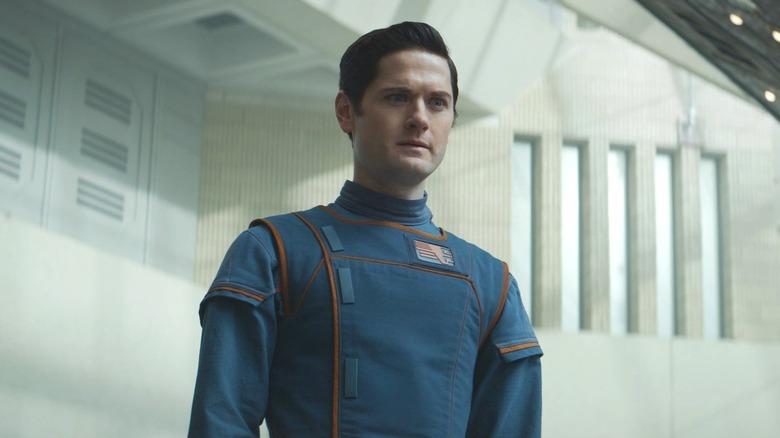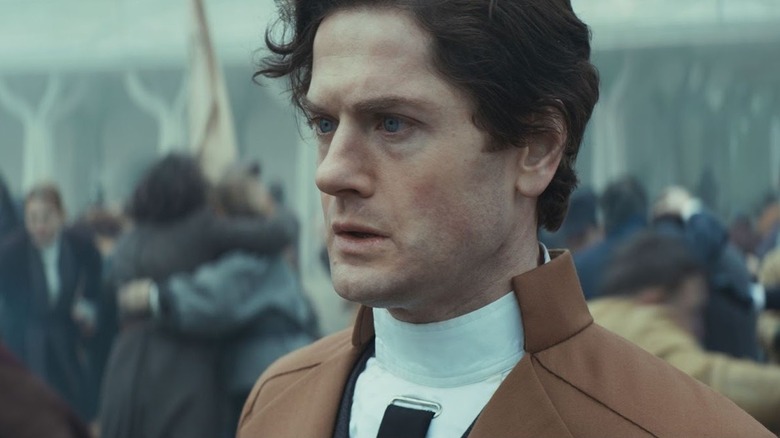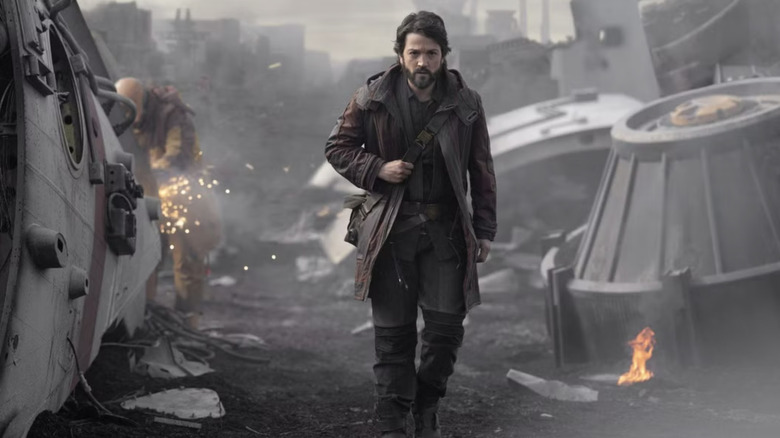Why Andor's Creator Thinks Syril Karn Is The Show's Most Romantic Character
This article contains spoilers for "Andor."
"Andor" is the story of, well, Cassian Andor (Diego Luna) and how he goes from a small-time criminal to the rebel that helps bring down the Death Star. But Imperial officer Syril Karn (Kyle Soller), who first tries to arrest Cassian, thinks he's the hero of the story. Syril doesn't question the Empire's evil actions, or his own — until "Andor" season 2, when he learns his girlfriend Dedra Meero (Denise Gough) used him as a tool to help move facilitate a genocide on planet Ghorman.
Fans and critics have described Syril as a "worm" or "bootlicker" (by Soller himself), and he earns those descriptors. He's a bureaucrat looking to climb the ladder, not especially sadistic but with a huge sense of self-importance, even if he can't get out from his belittling mother's (Kathryn Hunter) heel. Syril is unlike other "Star Wars" villains in this way, because he's there to show in a regime like the Empire, most of the evil is not carried out by dark wizards, evil Sith Lords, or even big shot commandants like Grand Moff Tarkin (Peter Cushing). It's done by "normal" people born and raised in an evil environment.
But "Andor" creator Tony Gilroy has a different perspective on Syril. On the "Happy Sad Confused" podcast with Josh Horowitz, Gilroy called Syril "a romantic character," and went as far as to deem him "maybe the most romantic character in the whole show." He specifically contrasts the wide-eyed Syril with the realist Dedra, who is "a true believer. She grew up in an Imperial kinderblock, she's a zealot. Whatever chaos is inside her is contained."
Gilroy pointed to the opening scene of "Andor" episode 5, "The Axe Forgets." Syril has been fired as a police officer on planet Morlana One, so he has to move back in with his mother on Coruscant. Sitting in his childhood bedroom, he looks out the window and sees light piercing through the window and touching his face. "[Syril's] fantasies could be anything, and he buys into this fascist, Imperial mindset and constructs everything," said Gilroy. "The whole cathedral he builds inside himself is all about that."
Syril's fate in the "Andor" season 2 episode "Who Are You?" is well-earned in its brutality; he sees the massacre he helped start as it's carried out, spots Cassian, and attacks him, but realizes the man he's fighting doesn't even know who he is. He gets one moment for that to sink and then is shot in the head. It's what Syril deserved, but Gilroy said it's not supposed to be completely satisfactory. "When [Syril's dream] comes crashing down, that's really sad to me [...] if you're writing well, you feel that way about all of [your characters]."
How Syril Karn's fate underlines the themes of Andor
"What does fascism do?" asked Gilroy rhetorically on "Happy Sad Confused." "It doesn't just destroy the people it comes for first and the communities, and the organizations, and the law, and the truth, and the rest of it. Inevitably, in every model of fascism that there's been, it ultimately comes and destroys its early proponents, and its foot soldiers, and its underclass [...] because it's all centralized power, it eventually eats its young."
Gilroy's words are key to understanding the ends for the villainous characters of "Andor," and not just Syril. Dedra is framed for treason and locked up in an Imperial prison, which Denise Gough thought was a "righteous" fate for her character. Spy chief Lio Partagaz (Anton Lesser) takes his own life rather than face Imperial punishment. Even extending this to the events of "Rogue One," Orson Krennic (Ben Mendelsohn) is vaporized by the Death Star he built.
From what Gilroy says, it sounds like he wasn't trying to reinforce his own political beliefs and the idea that fascism destroys its own supporters, he was just acknowledging history and reality, because his summation of fascism is reality. Cultural critic Umberto Eco, born in Mussolini's Italy, listed the ideology's contradictory tenets in his 1995 essay "Ur-Fascism." Under fascism, "everybody is educated to become a hero," and "this cult of heroism is strictly linked with the cult of death." Yet fascism also demands submission of one's self and mind to the whole. "For Ur-Fascism, disagreement is treason."
Syril, who is indoctrinated yet also a dreamer, displays how these two qualities fester in a fascist's heart. Speaking to Vulture, Soller argued that "Andor" is "like a coming-of-age story" for Syril, who is "someone who's not yet fully formed ... He just represents so clearly the banality of evil. The everyman who said yes way too often or drank the Kool-Aid one too many times growing up in a place like Coruscant. I mean, look at his mother and you understand why he'd latch onto a dominating behemoth like the Empire."
In Andor, rebellion is not a romantic hero's journey
Here's a thought: Since Syril is serving a banal evil, can he truly be the most "romantic" character in a show all about rebels fighting against that regime? The difference is the Rebellion is full of short-term cynics. Though "Andor" does not ever indulge in facile both-sidesism, it isn't blind to the compromises that revolutionaries need to make to win against more powerful enemies. As Saw Gerrera (Forest Whitaker) puts it, "Revolution is not for the sane." Luthen Rael (Stellan Skarsgård) and his partner Kleya Marki (Elizabeth Dulau) have made a pact to undermine the Empire in any way that they can. Luthen succinctly states: "I burn my life to make a sunrise I know I'll never see." Even the first time we meet Cassian in "Rogue One," he murders one of his sources to keep the man quiet.
Gilroy's "Star Wars" work takes the fairy tale simplicity and pluckiness out of the Rebellion. The rebels are ruthless pragmatists serving an idealistic goal, and this is not a contradiction. To take up an armed revolution, you have to have a deep conviction that things are not right, while someone like Syril thinks they are.
The story of Syril Karn is ultimately a warning about romanticism. Fascism is an ugly death machine, but it caters to the romantic impulses — like an idealized past, a wish to become a hero, or desperation for belonging to and finding approval in something greater — that live inside all our hearts.
"Andor" is streaming on Disney+.


